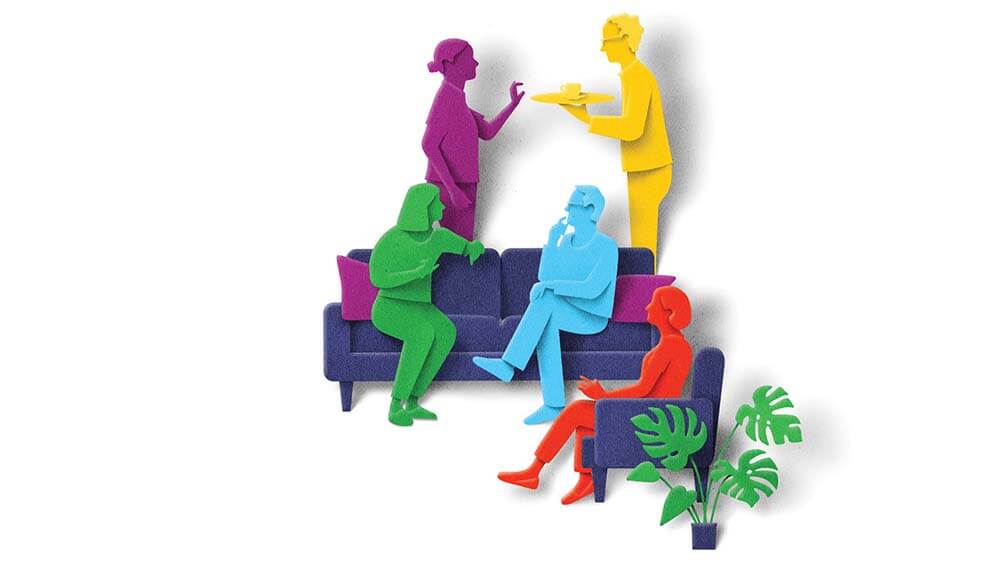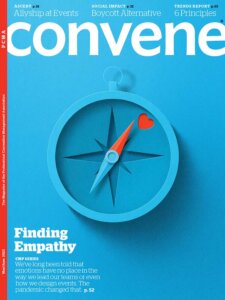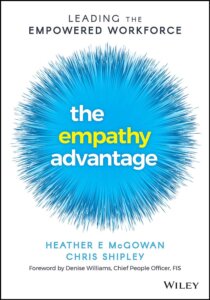
“Making the effort to really understand how your workers are thinking now … is so worth it,” authors Heather E. McGowan and Chris Shipley write in The Empathy Advantage: Leading the Empowered Workforce. (Illustration by Eiko Ojala)
An empowered workforce makes the path forward uncertain for leaders, Heather E. McGowan and Chris Shipley write in The Empathy Advantage, particularly for those “who have spent their careers refining their business and process management skills at the expense of people skills.” And while the disruption of a pandemic did not cause work, cultural, and social norms to change, they write, COVID put those changes “in sharp relief. The pandemic, then, is both a breaking point and an opportunity. It is a break from past work structures and an opportunity to refocus on the human capacity that drives value in work and in life.

This interview is part of our May/June cover and CMP Series story package. Find the print facsimile edition here.
“Making the effort to really understand how your workers are thinking now, to dive into what truly motivates people to engage deeply in their work and with their colleagues, is so worth it,” McGowan and Shipley continue, “not simply because it creates a more positive workplace, but because it is the single most important thing you can do to unlock value in your business.”
Convene spoke with McGowan and Shipley over Zoom to learn more about leading teams with empathy — and how to tap into that same emotional intelligence to design events. The two workplace experts, who previously collaborated on the 2020 book, The Adaptation Advantage: Let Go, Learn Fast, and Thrive in the Future of Work, are no strangers to the events industry. McGowan is a sought-after speaker at global corporate and association events and Shipley is the former executive producer of the DEMO Conference for the data and tech sectors.
Here’s the first of a four-part interview with the authors:
Do you think that workers still have the same level of agency as when you first wrote the book?
McGowan: Everyone declared the Great Resignation was over in 2021, but actually more people quit in 2022 and more people are planning to quit, according to the latest Bankrate survey [56 percent of workers said they would be looking for a new job in the next 12 months], in 2023 than 2022. I think something’s going on where there’s a desire to declare some economic fragility in order to restore power over the workers. I just simply do not think that’s happening. [The thinking is] “We’re not getting out of workers what we want by the old method [so] throw some more fear in there and double down.” That’s my take on it.
Shipley: I agree. I think that for the last year and a half, certain sectors, primarily financial sectors, have been trying to will a recession into being, even though the economic indicators aren’t really supporting that. Yes, there were fewer new hires, but the job numbers are still up. I think we’ve got this media story, or a narrative generally, that the sky is falling and that this will allow everything to return to a pre-pandemic way of being. The thesis of our book is workers now have or had — through the pandemic — this trust and autonomy, and agency to do work.
Once you have that as a worker, you’re not going to give it up easily. You don’t put that genie back in the bottle. While we see so many organizations that are struggling to try to go back to the way something was, it’s in opposition to the need to go forward in a new way. I think that’s where we’re finding this tension and these narratives around job numbers. Hopefully, that gets us back to something that doesn’t feel like the master- worker arrangement that ultimately wasn’t driving a healthy workplace.

Future of work and technology strategists Heather E. McGowan (left) and Chris Shipley previously collaborated on the 2020 book, The Adaptation Advantage: Let Go, Learn Fast, and Thrive in the Future of Work.
Salesforce CEO Mark Benioff has been known for his empathetic leadership style — he often told staff, “we’re a family.” But after laying off 8,000 staffers, many of those remaining complained that the company’s touchy-feely culture was just a facade. How can you lead with empathy while making tough staffing decisions?
McGowan: You can’t afford not to be empathetic. If the greatest value in your organization comes from humans, and humans are activated by intrinsic motivation, how can you not be empathetic as a means — even if you didn’t care about them — to activate their intrinsic motivation for higher levels of performance?
I was at one of my clients’ events that I’ve gone to four or five times as a speaker, and we did a breakout based upon the book after the talk. One of the executives — and this is a Fortune 10 huge company — said to me, “I didn’t really have to know my people before when I just drove process, I didn’t really care about them. Now, I have to know them as people.”
Shipley: I think that for generations, we’ve heard leaders talk about, “We’re a family here at this fill-in-the-blank organization” and many of those are really dysfunctional families [chuckles]. I think that the problem here is that putting that word on top of your workplace has a whole lot of implications. If my brother doesn’t do the dishes properly or effectively, I can’t throw him out of the family. I can scold him, but I can’t get rid of him. In an organization, if you’re not performing or the needs of the organization change, suggesting that everyone is family has this implication that we’ll be able to always employ you. Realistically, that’s not true.
 I think there are lots of ways that the companies can be so much more effective in handling layoffs or even foregoing layoffs in order to do retraining. Like this whole dump-and-repeat model — one company starts laying off and they all have to do it. Again, in this supposed culture that we are a family, that really [sets up] a whole lot of expectations that make it very difficult to navigate those really challenging economic realities.
I think there are lots of ways that the companies can be so much more effective in handling layoffs or even foregoing layoffs in order to do retraining. Like this whole dump-and-repeat model — one company starts laying off and they all have to do it. Again, in this supposed culture that we are a family, that really [sets up] a whole lot of expectations that make it very difficult to navigate those really challenging economic realities.
McGowan: I think one of the things we say is your workplace can be a community; it’s not your family. It’s not healthy for that to be the case.
Shipley: I’ve had conversations since the book came out [about people thinking having] empathy means you just have to be nice to everybody. Or empathy means you’ve got to fix everyone’s problems — and it doesn’t. It means really being able to understand and act from the perspective of someone other than yourself or from the perspective of the people who are your employees. That doesn’t mean that everyone gets to stay in play.
There are realities in an organization that cause the workforce to shift. This idea of leading with empathy seems, on the surface, to put the onus on a leader to somehow make sure everyone is happy and satisfied in their work. That’s not what we mean by empathy, but we do mean that you can understand and really tap the intrinsic motivations and desires of your workforce so they are much better contributors, they’re much more engaged at work. Then engaged employees are more — we try to avoid using the word productive because it implies we’re just putting people on an assembly line — but there is a performance element in that. I perform in places where I feel I’m a part of a community, that I belong, people understand me, and they value my contribution. That doesn’t mean that I expect my boss to always make me happy or that I’m not going to ever have a bad day at work. It does mean that I’m going to look to myself first for my motivation to perform.
Michelle Russell is editor in chief of Convene.
